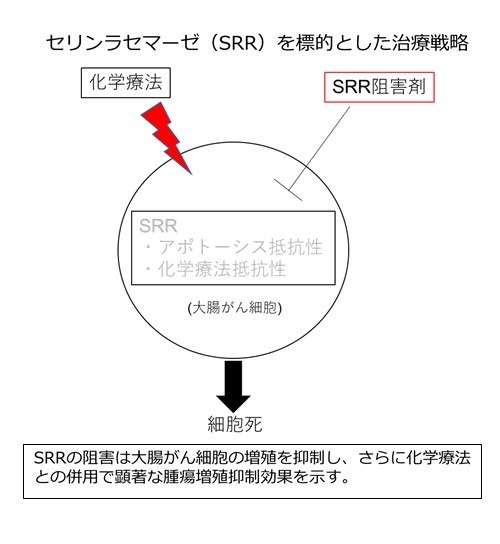Development of therapeutic targets for colorectal cancer metabolism
Information updated: October 3, 2023
- Seeds Information
- Researcher Information
- What do you expect from collaboration with companies?
- Contact for this research
Seeds Information
keyword
Serine racemase (SRR), cancer metabolism
Field
Cancer (colon cancer)
Overview
It is known that cancer cells have acquired metabolic dynamics that are completely different from those of normal tissues in order to give themselves an advantage in survival, and in recent years, attempts have been made to identify cancer-specific metabolic pathways and develop therapeutic approaches that target these pathways.
We have demonstrated that a metabolic enzyme called serine racemase (SRR), whose function has been revealed only in the central nervous system, is involved in the metabolic pathway that produces pyruvate from L-serine in colorectal cancer, and promotes the proliferation of colorectal cancer by contributing to histone acetylation, maintenance of mitochondrial quantity and quality, and apoptosis resistance. We also confirmed by immunohistochemical staining that the expression of SRR is increased in human colorectal adenomas and colorectal cancer tissues compared to non-tumor tissues (colorectal cancer > colorectal adenoma > non-tumor tissues). We also demonstrated that an SRR inhibitor suppressed the proliferation of colorectal cancer cells, and showed a significant proliferation-suppressing effect in combination with existing anticancer drugs, suggesting the possibility that SRR could be a therapeutic target for colorectal cancer.
Colorectal cancer is one of the most common cancers in Japan in terms of both incidence and mortality, and it is difficult to cure in cases where surgery is inoperable or recurrent. Based on the results of this study, it is expected that SRR will become a new drug target that targets the metabolism of colorectal cancer.
What's new?
- Discovery of a new drug target related to cancer metabolism
What are its advantages over other studies?
- There is a possibility that this could lead to a new treatment for colorectal cancer.
・It has the effect of reducing chemotherapy resistance in colon cancer cells and enhancing the effects of chemotherapy.
What problem does it help solve?
・Treatment of intractable colon cancer
Possibility of other applications and developments
・Analysis of D-amino acids in the intestinal tract (feces) may lead to the establishment of risk prediction and diagnostic methods for colorectal cancer.
Related Patents
―
Researcher Information
| full name | Kenji Ohshima |
|---|---|
| Affiliation | School of Medicine Pathology Division of Molecular Pathology |
| Specialization | Cancer (colon cancer) |
| Collaborative Researcher | ― |
| Related links | Course introduction website |
What do you expect from collaboration with companies?
Collaborating with pharmaceutical companies to conduct the following drug discovery research targeting SRR:
- Obtaining small molecule compounds or antibodies that inhibit SRR
- Research and development of drugs to treat colon cancer.
Contact for this research
兵庫医科大学 大学事務部 研究推進課
E-mail: chizai@hyo-med.ac.jp
Tel: 0798-45-6488

 Research Seeds Collection
Research Seeds Collection
